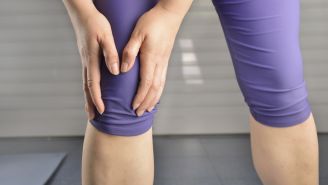Updated on May 26, 2023.
When you see a rheumatology specialist about joint symptoms for the first time, they will look at several factors to determine if you have rheumatoid arthritis (RA) or another condition. At your appointment, you can expect your healthcare provider (HCP) to:
- Ask questions about your symptoms and medical history
- Conduct a physical exam and check your affected joints
- Order blood tests
- Order imaging tests, which may include X-rays, a CT scan or ultrasound, or a magnetic resonance imaging (MRI) scan
Your symptoms and medical history
Your HCP is likely to start by asking what brought you in. Be as specific as possible about your joint pain and stiffness: when it hurts, where it hurts, how it feels, and whether your symptoms interfere with your daily activities. Mention if you're taking any medications or nutritional supplements, and whether they’ve made a difference. It may help to make a list of your symptoms before your appointment and bring it to your visit.
Your physical examination
In most cases, your HCP will do a thorough exam, checking your temperature, blood pressure, reflexes, muscle strength, lungs, skin, nails, eyes, mouth, and nose. And of course, your joints: Are they inflamed, swollen, tender, warm to the touch, reddened, or stiff? Is your range of motion limited?
Blood tests for RA
Blood tests can’t diagnose RA, but they can offer important clues. Some of these tests include:
Rheumatoid factor (RF)
RF is an antibody protein found in most, but not all, people with RA. RF may not be found if you're in the early stages; it's also sometimes found in people with other diseases. But the presence of RF along with symmetrical joint pain suggests RA is present.
C-reactive protein (CRP) and erythrocyte sedimentation rate (ESR, or “sed rate”)
These are markers for inflammation. A high ESR or CRP combined with other clues to RA helps make the diagnosis.
Anti-CCP
Antibodies to a protein called cyclic citrullinated peptide, or CCP, are present in many people with RA and are one of the strongest markers of rheumatoid arthritis. An anti-CCP test may help your doctor confirm that you have RA, even if your RF test shows no sign of it.
Imaging tests
X-rays can help distinguish between rheumatoid arthritis, osteoarthritis, and other conditions. But because bone damage may not yet be visible, early RA doesn’t always show up in X-rays. An MRI, CT scans, or ultrasound may be better at finding early signs of rheumatoid arthritis.
If RA is diagnosed, your provider can use results from the initial exam as a reference point to measure your progress and adjust your treatments over time.






